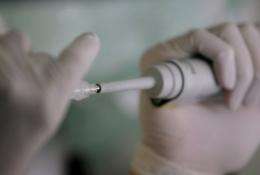'Three-parent babies' public consultation launched

The British public are being consulted on the ethics of a fertility treatment that uses DNA from a third parent to help eliminate genetic diseases, the government announced on Monday.
The results of the consultation will help inform a decision by Health Secretary Jeremy Hunt on whether to legalise the treatment as early next year—potentially making Britain the first country in the world to hold human trials into the treatment, the Daily Telegraph reported.
The IVF-based technique is designed to avoid serious mitochondrial diseases inherited on the maternal side, such as muscular dystrophy, by replacing some of the mitochondrial DNA with healthy DNA from the so-called "third parent".
One in 200 children are born each year with a form of disease in their mitochondrial DNA, the structures within cells that convert energy from food into a form that the body can use.
Many of those children have mild to no symptoms, and may never even have the disease diagnosed, the Human Fertilisation and Embryology Authority, which is overseeing the consultation, said in a press statement.
Others can have severe, even life-shortening symptoms such as muscular weakness or heart disease. The Telegraph reported that up to one in 6,500 people born in Britain each year suffer severe symptoms.
Scientists are developing a technique to remove some of the mitochondrial DNA of the mother and replace it with DNA from the "third parent" to create a healthy embryo.
The technique is currently lawful in a laboratory but the embryos cannot be used in treatment, the HFEA said, calling the treatment "uncharted territory".
"Any child born following mitochondria replacement would share DNA with three people, albeit a tiny amount with the donor," the organisation said in a statement. "These changes would affect the germ line, meaning the donor's mitochondrial DNA would be passed on to future generations."
"We will use our considerable experience of explaining complicated areas of science and ethics to the public to generate a rich debate that is open to all," chairman Lisa Jardine said in a press release.
She stated: "We find ourselves in uncharted territory, balancing the desire to help families have healthy children with the possible impact on the children themselves and wider society."
Jardine called the decision one of "enormous public interest".
It furthers the debate on "designer babies" and the morality of engineering embryos first fuelled by the original forays into IVF treatment.
There are also fears over how the "third parent" would affect the child's sense of identity, and what rights both the child and the third parent would have.
The consultation will run until December 7, with the public encouraged to discuss whether the clinical benefits outweigh any moral, ethical or other health concerns via the HFEA website at www.hfea.gov.uk/ .
(c) 2012 AFP













